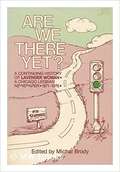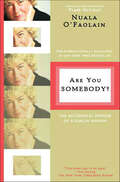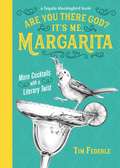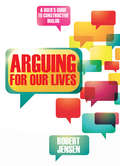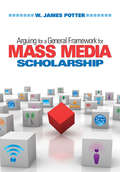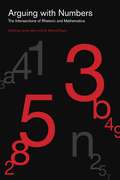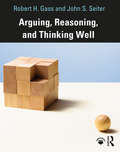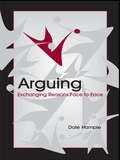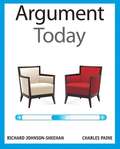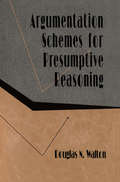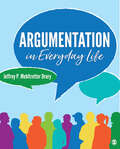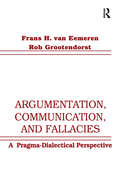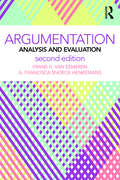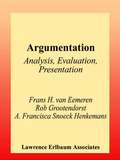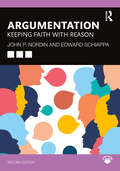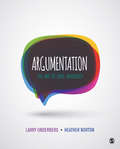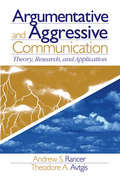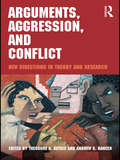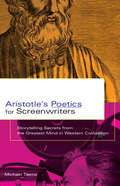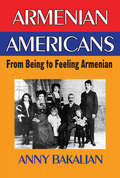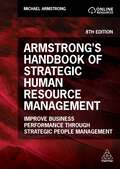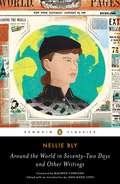- Table View
- List View
Are We There Yet?: A Continuing History Of Lavender Woman: A Chicago Lesbian Newpaper 1971-1976
by Michal BrodySerious yet entertaining history of an exciting lesbian era. Thought-provoking analysis and lively description.
Are You Somebody?: The Accidental Memoir of a Dublin Woman
by Nuala O'Faolain"You don't want the book to end; it glows with compassion and you want more, more because you know this is a fine wine of a life, richer as it ages."—Frank McCourt, author of Angela's AshesOne of nine children born into a penniless North Dublin family, Nuala O'Faolain was saved from a harrowing childhood by her love of books and reading. Though she ultimately became one of Ireland's best-known columnists, her professional success did little to ease her loneliness and longing for a deep connection to the world. Are You Somebody? distills her experiences into a wisdom that can only come from an obstinate refusal to shrink from life.This commemorative edition of her landmark memoir celebrates O'Faolain's remarkable life and work with a new foreword from Frank McCourt as well as additional archival materials. Strikingly vivid and starkly emotional, Are You Somebody? is, like O'Faolain herself, a singular example of courage, honesty, and bold living.
Are You There God? It's Me, Margarita: More Cocktails with a Literary Twist (A Tequila Mockingbird Book)
by Tim Federle Lauren Mortimer<p>Literature, puns, and alcohol collide in this clever follow-up to Tequila Mockingbird, the world's bestselling cocktail recipes book. <p>Tim Federle's Tequila Mockingbird has become one of the world's bestselling cocktail books and resonated with bartenders and book clubs everywhere. Now in this much anticipated follow-up, Are You There God? It's Me, Margarita, Federle has shaken up 49 all-new, all-delicious drink recipes paired with his trademark puns and clever commentary on more of history's most beloved books, as well as bar bites, drinking games, and whimsical illustrations throughout. <p>Cocktails include: Fifty Shades of Grey Goose, The Handmaid's Ale, Little Soused on the Prairie, Tender Is the Nightcap, A Room With Vermouth, Go Get a Scotch, Man; As I Lay Drinking, and much more!
Arguing for Our Lives
by Robert JensenWe live in a time when public discourse is more skewed than ever by the propaganda that big money can buy, with trust in the leadership of elected officials at an all-time low. The "news" has degenerated into sensationalist sound bites, and the idea of debate has become a polarized shouting match that precludes any meaningful discussion.It's also a time of anxiety, as we're faced with economic and ecological crises on a global scale, with stakes that seem higher than ever before. In times like these, it's essential that we be able to think and communicate clearly.In this lively primer on critical thinking, Robert Jensen attacks the problems head on and delivers an accessible and engaging book that explains how we can work collectively to enrich our intellectual lives. Drawing on more than two decades of classroom experience and community organizing, Jensen shares strategies on how to challenge "conventional wisdom" in order to courageously confront the crises of our times and offers a framework for channeling our fears and frustrations into productive analysis that can inform constructive action.Jensen connects abstract ideas with the everyday political and spiritual struggles of ordinary people. Free of either academic or political jargon, this book is for anyone struggling to understand our world and contribute to making it a better place.Robert Jensen is a professor in the School of Journalism at the University of Texas at Austin and a founding board member of the Third Coast Activist Resource Center.
Arguing for a General Framework for Mass Media Scholarship
by Dr W. James Potter"Arguing for a General Framework for Mass Media Scholarship challenges scholars and students to consider and reconsider what we know about media and how we think about media. As such, the book provides an important framework for thinking about knowledge—regardless of the discipline… The text provides all of the necessary tools to move the field forward in a way that will increase the rigor of the work being done and augment the overall profile of the discipline." –Dana Mastro, University of Arizona In this groundbreaking book, W. James Potter presents an innovative perspective to media scholars and students who are frustrated with the fragmentation of research findings across so many journals, books, and fields. Arguing for a General Framework for Mass Media Scholarship presents a clear plan for a more efficient way to build knowledge about the mass media so that it can be better organized and made more useful. Key Features Conducts an in-depth analysis of mass media scholarship's four major facets of effects, content, audiences, and organizations Presents a significant shift in conceptualizing media effects and ways research can be conducted to generate more useful knowledge about media influence Develops "narrative line" as a tool to guide analyses about how content decisions are made by producersSynthesizes a system of explanation about why audiences attend to certain messages and how individuals construct meaning from those messagesIncorporates an analysis of mass media organizations to provide greater context of understanding messages and their effects on individuals and macro units in society"The book will play an important role in providing structure to a broad, fragmented discipline. I believe it will, at the very least, create important dialogues about what we now know/understand about areas of mass media, and where we should move as a discipline… This book is clearly a 'call to arms' for mass media scholars to ratchet up the quality of research (and what we know), to see the interconnections within and among strands of scholarship, and to move forward in a more efficient, organized manner. Professor Potter should be commended for this." —Roger Cooper, Ohio University "This book is...that call to action that comes forward every few years, to wake us up and challenge our ways of doing things, not by being radical, but via synthesis... I've been waiting for several years for a book like this." —Sahara Byrne, Cornell University
Arguing with Numbers: The Intersections of Rhetoric and Mathematics (RSA Series in Transdisciplinary Rhetoric #16)
by James Wynn G. Mitchell ReyesAs discrete fields of inquiry, rhetoric and mathematics have long been considered antithetical to each other. That is, if mathematics explains or describes the phenomena it studies with certainty, persuasion is not needed. This volume calls into question the view that mathematics is free of rhetoric. Through nine studies of the intersections between these two disciplines, Arguing with Numbers shows that mathematics is in fact deeply rhetorical. Using rhetoric as a lens to analyze mathematically based arguments in public policy, political and economic theory, and even literature, the essays in this volume reveal how mathematics influences the values and beliefs with which we assess the world and make decisions and how our worldviews influence the kinds of mathematical instruments we construct and accept. In addition, contributors examine how concepts of rhetoric—such as analogy and visuality—have been employed in mathematical and scientific reasoning, including in the theorems of mathematical physicists and the geometrical diagramming of natural scientists. Challenging academic orthodoxy, these scholars reject a math-equals-truth reduction in favor of a more constructivist theory of mathematics as dynamic, evolving, and powerfully persuasive. By bringing these disparate lines of inquiry into conversation with one another, Arguing with Numbers provides inspiration to students, established scholars, and anyone inside or outside rhetorical studies who might be interested in exploring the intersections between the two disciplines.In addition to the editors, the contributors to this volume are Catherine Chaput, Crystal Broch Colombini, Nathan Crick, Michael Dreher, Jeanne Fahnestock, Andrew C. Jones, Joseph Little, and Edward Schiappa.
Arguing with Numbers: The Intersections of Rhetoric and Mathematics (RSA Series in Transdisciplinary Rhetoric)
by James Wynn G. Mitchell ReyesAs discrete fields of inquiry, rhetoric and mathematics have long been considered antithetical to each other. That is, if mathematics explains or describes the phenomena it studies with certainty, persuasion is not needed. This volume calls into question the view that mathematics is free of rhetoric. Through nine studies of the intersections between these two disciplines, Arguing with Numbers shows that mathematics is in fact deeply rhetorical. Using rhetoric as a lens to analyze mathematically based arguments in public policy, political and economic theory, and even literature, the essays in this volume reveal how mathematics influences the values and beliefs with which we assess the world and make decisions and how our worldviews influence the kinds of mathematical instruments we construct and accept. In addition, contributors examine how concepts of rhetoric—such as analogy and visuality—have been employed in mathematical and scientific reasoning, including in the theorems of mathematical physicists and the geometrical diagramming of natural scientists. Challenging academic orthodoxy, these scholars reject a math-equals-truth reduction in favor of a more constructivist theory of mathematics as dynamic, evolving, and powerfully persuasive. By bringing these disparate lines of inquiry into conversation with one another, Arguing with Numbers provides inspiration to students, established scholars, and anyone inside or outside rhetorical studies who might be interested in exploring the intersections between the two disciplines.In addition to the editors, the contributors to this volume are Catherine Chaput, Crystal Broch Colombini, Nathan Crick, Michael Dreher, Jeanne Fahnestock, Andrew C. Jones, Joseph Little, and Edward Schiappa.
Arguing, Reasoning, and Thinking Well
by Robert Gass John SeiterArguing, Reasoning, and Thinking Well offers an engaging and accessible introduction to argumentation and critical thinking. With a pro-social focus, the volume encourages readers to value civility when engaged in arguing and reasoning. Authors Gass and Seiter, renowned for their friendly writing style, include real-world examples, hypothetical dialogues, and editorial cartoons to invite readers in. The text includes a full chapter devoted to the ethics of argument, as well as content on refutation and formal logic. It is designed for students in argumentation and critical thinking courses in communication, philosophy, and psychology departments, and is suitable for students and general education courses across the curriculum.
Arguing: Exchanging Reasons Face to Face (Routledge Communication Series)
by Dale HampleArguing: Exchanging Reasons Face to Face describes the process and products of face-to-face argument. Author Dale Hample presents arguing as a type of interpersonal interaction, rather than as a kind of text or a feature of a public speech. He focuses primarily on argument production, and explores the rhetorical and philosophical traditions of arguing, keeping as the volume's main focus the integration of arguing into the literatures on message production, conflict management, and interpersonal communication.Distinctive in its approach, this volume offers:*a synthesis of empirical research on situational and individual differences in arguing;*an exploration of argument frames--perceptions and expectations about arguing;*an examination of the conversational and rational natures of argument products;*a psychological description of inventional processes; and*a full chapter on the emotional experience of arguing.This unique work is appropriate for scholars and graduate students in argumentation, discourse, persuasion, conflict management, interpersonal communication, organizational communication, and message production.
Argument Today
by Richard Johnson-Sheehan Charles PainePersuasion (Rhetoric) -- Problems, exercises, etc. textbook for college students
Argumentation Schemes for Presumptive Reasoning
by Douglas WaltonRecent concerns with the evaluation of argumentation in informal logic and speech communication center around nondemonstrative arguments that lead to tentative or defeasible conclusions based on a balance of considerations. Such arguments do not appear to have structures of the kind traditionally identified with deductive and inductive reasoning, but are extremely common and are often called "plausible" or "presumptive," meaning that they are only provisionally acceptable even when they are correct. How is one to judge, by some clearly defined standard, whether such arguments are correct or not in a given instance? The answer lies in what are called argumentation schemes -- forms of argument (structures of inference) that enable one to identify and evaluate common types of argumentation in everyday discourse. This book identifies 25 argumentation schemes for presumptive reasoning and matches a set of critical questions to each. These two elements -- the scheme and the questions -- are then used to evaluate a given argument in a particular case in relation to a context of dialogue in which the argument occurred. In recent writings on argumentation, there is a good deal of stress placed on how important argumentation schemes are in any attempt to evaluate common arguments in everyday reasoning as correct or fallacious, acceptable or questionable. However, the problem is that the literature thus far has not produced a precise and user-friendly enough analysis of the structures of the argumentation schemes themselves, nor have any of the documented accounts been as helpful, accessible, or systematic as they could be, especially in relation to presumptive reasoning. This book solves the problem by presenting the most common presumptive schemes in an orderly and clear way that makes them explicit and useful as precisely defined structures. As such, it will be an indispensable tool for researchers, students, and teachers in the areas of critical thinking, argumentation, speech communication, informal logic, and discourse analysis.
Argumentation in Everyday Life
by Jeffrey P. Drury"Good coverage of concepts with understandable explanations of theory. Very user friendly with exercises to use in and out of class. Connects well with other communication classes through the application of other communication concepts to argumentation." —Christopher Leland, Azusa Pacific University Argumentation in Everyday Life provides students with the tools they need to argue effectively in the classroom and beyond. Jeffrey P. Mehltretter Drury offers rich coverage of theory while balancing everyday applicability, allowing students to use their skills soundly. Drury introduces the fundamentals of constructing and refuting arguments using the Toulmin model and ARG conditions (Acceptability, Relevance, and Grounds). Numerous real-world examples are connected to the theories of rhetoric and argumentation discussed—enabling students to practice and apply the content in personal, civic, and professional contexts, as well as traditional academic debates. Encouraging self-reflection, this book empowers students to find their voice and create positive change through argumentation in everyday life. Unique resources to help students navigate this complex terrain of argumentation: "The Debate Situation" offers students a birds-eye view of any given debate (or exchange of arguments between two or more people) organized around three necessary components: arguments, issues, and the proposition. The visual model of the debate situation illustrates how these features work together in guiding a debate and it lays the groundwork for understanding and generating arguments. Easy to Use Standards for Evaluating Arguments combine a prominent argument model (named after logician Stephen Toulmin) with a standards-based approach (the ARG conditions) to test of quality of an argument. The ARG conditions are three questions an advocate should ask of an argument in determining whether or not it is rationally persuasive. These questions are best served by research but don’t necessary require it, and thus they provide a useful posture for critically assessing the arguments you encounter. Multiple "Everyday Life" examples with an emphasis on context help students to connect the lessons more fully to their everyday life and encourages them to grapple explicitly with dilemmas arising in different contexts. "Find Your Voice Prompts" focus on choice & empowerment to offer strategies for students to choose which arguments to address and how to address them—empowering students to use argumentation to find their voice. "Build Your Skill Prompts" use objective applications to test how well students have learned the information. They offer a chance to apply the material to additional examples that students can check against the answers in Appendix II. Two application exercises at the end of each chapter encourage students to think critically about the content, discuss their thoughts with their peers, and apply the material to everyday situations.
Argumentation in Everyday Life
by Jeffrey P. Drury"Good coverage of concepts with understandable explanations of theory. Very user friendly with exercises to use in and out of class. Connects well with other communication classes through the application of other communication concepts to argumentation." —Christopher Leland, Azusa Pacific University Argumentation in Everyday Life provides students with the tools they need to argue effectively in the classroom and beyond. Jeffrey P. Mehltretter Drury offers rich coverage of theory while balancing everyday applicability, allowing students to use their skills soundly. Drury introduces the fundamentals of constructing and refuting arguments using the Toulmin model and ARG conditions (Acceptability, Relevance, and Grounds). Numerous real-world examples are connected to the theories of rhetoric and argumentation discussed—enabling students to practice and apply the content in personal, civic, and professional contexts, as well as traditional academic debates. Encouraging self-reflection, this book empowers students to find their voice and create positive change through argumentation in everyday life. Unique resources to help students navigate this complex terrain of argumentation: "The Debate Situation" offers students a birds-eye view of any given debate (or exchange of arguments between two or more people) organized around three necessary components: arguments, issues, and the proposition. The visual model of the debate situation illustrates how these features work together in guiding a debate and it lays the groundwork for understanding and generating arguments. Easy to Use Standards for Evaluating Arguments combine a prominent argument model (named after logician Stephen Toulmin) with a standards-based approach (the ARG conditions) to test of quality of an argument. The ARG conditions are three questions an advocate should ask of an argument in determining whether or not it is rationally persuasive. These questions are best served by research but don’t necessary require it, and thus they provide a useful posture for critically assessing the arguments you encounter. Multiple "Everyday Life" examples with an emphasis on context help students to connect the lessons more fully to their everyday life and encourages them to grapple explicitly with dilemmas arising in different contexts. "Find Your Voice Prompts" focus on choice & empowerment to offer strategies for students to choose which arguments to address and how to address them—empowering students to use argumentation to find their voice. "Build Your Skill Prompts" use objective applications to test how well students have learned the information. They offer a chance to apply the material to additional examples that students can check against the answers in Appendix II. Two application exercises at the end of each chapter encourage students to think critically about the content, discuss their thoughts with their peers, and apply the material to everyday situations.
Argumentation, Communication, and Fallacies: A Pragma-dialectical Perspective
by Rob Grootendorst Frans H. van EemerenThis volume gives a theoretical account of the problem of analyzing and evaluating argumentative discourse. After placing argumentation in a communicative perspective, and then discussing the fallacies that occur when certain rules of communication are violated, the authors offer an alternative to both the linguistically-inspired descriptive and logically-inspired normative approaches to argumentation. The authors characterize argumentation as a complex speech act in a critical discussion aimed at resolving a difference of opinion. The various stages of a critical discussion are outlined, and the communicative and interactional aspects of the speech acts performed in resolving a simple or complex dispute are discussed. After dealing with crucial aspects of analysis and linking the evaluation of argumentative discourse to the analysis, the authors identify the fallacies that can occur at various stages of discussion. Their general aim is to elucidate their own pragma- dialectical perspective on the analysis and evaluation of argumentative discourse, bringing together pragmatic insight concerning speech acts and dialectical insight concerning critical discussion.
Argumentation: Analysis and Evaluation (Routledge Communication Series #8)
by Frans H. van Eemeren A. Francisca HenkemansThis book concentrates on argumentation as it emerges in ordinary discourse, whether the discourse is institutionalized or strictly informal. Crucial concepts from the theory of argumentation are systematically discussed and explained with the help of examples from real-life discourse and texts. The basic principles are explained that are instrumental in the analysis and evaluation of argumentative discourse. Methodical instruments are offered for identifying differences of opinion, analyzing and evaluating argumentation and presenting arguments in oral and written discourse. Attention is also paid to the way in which arguers attempt to be not just reasonable, but effective as well, by maneuvering strategically. In addition, the book provides a great variety of exercises and assignments to improve the student’s skill in presenting argumentation. The authors begin their treatment of argumentation theory at the same juncture where argumentation also starts in practice: The difference of opinion that occasions the evolvement of the argumentation. Each chapter begins with a short summary of the essentials and ends with a number of exercises that students can use to master the material. Argumentation is the first introductory textbook of this kind. It is intended as a general introduction for students who are interested in a proper conduct of argumentative discourse. Suggestions for further reading are made for each topic and several extra assignments are added to the exercises. Special features: • A concise and complete treatment of both the theoretical backgrounds and the practice of argumentation analysis and evaluation. • Crucial concepts from pragmatics (speech act theory, Grice’s cooperative principle) presented in a non-technical way; introducing the theory of verbal communication. • The first textbook treatment of strategic maneuvering as a way of balancing being reasonable with being effective • Exercises and assignments based on real-life texts from a variety of contexts.
Argumentation: Analysis, Evaluation, Presentation
by Frans H. van Eemeren A. Francisca Henkemans Rob GrootendorstThis book concentrates on argumentation as it emerges in ordinary discourse, whether the discourse is institutionalized or strictly informal. Crucial concepts from the theory of argumentation are systematically discussed and explained with the help of examples from real-life discourse and texts. The basic principles are explained that are instrumental in the analysis and evaluation of argumentative discourse. Methodical instruments are offered for identifying differences of opinion, analyzing and evaluating argumentation and presenting arguments in oral and written discourse. In addition, the book provides a great variety of exercises and assignments to improve the students' skill in presenting argumentation. The authors begin their treatment of argumentation theory at the same juncture where argumentation also starts in practice: The difference of opinion that occasions the evolvement of the argumentation. Each chapter begins with a short summary of the essentials and ends with a number of exercises that students can use to master the material. Argumentation is the first introductory textbook of this kind. It is intended as a general introduction for students who are interested in a proper conduct of argumentative discourse. Suggestions for further reading are made for each topic and several extra assignments are added to the exercises. Special features: * A concise and complete treatment of both the theoretical backgrounds and the practice of argumentation analysis and evaluation. * Crucial concepts from pragmatics (speech act theory, Grice's cooperative principle) presented in a non-technical way; introducing the theory of verbal communication. * Unique coverage of both oral and written presentation of arguments. * Exercises and assignments based on real-life texts from a variety of contexts.
Argumentation: Keeping Faith with Reason
by Edward Schiappa John P. NordinThis extensively updated second edition provides a comprehensive introduction to argumentation skills for undergraduates.Clearly written, with minimal technical jargon, the book features many contemporary real-world examples. Through a unique conceptual framework, students will learn how to assemble a coherent logical argument, assess sources, and organize and present written and verbal arguments. The authors use the Toulmin model throughout to present issues and clarify concepts and have expanded the model to show how it can be used to examine real-world arguments. This new edition provides a deeper focus on value claims and credibility. It also shows students how to assess fake news, misinformation, and post-truth and incorporates more social scientific theories of persuasion such as the Elaboration Likelihood Model.Argumentation: Keeping Faith with Reason is an ideal textbook for undergraduate courses in argumentation, persuasion, critical thinking, and informal logic.An Instructor’s Manual including advice on how to teach each section, sample quizzes, and additional examples is available at https://routledge.com/9781032541228.
Argumentation: The Art of Civil Advocacy
by Larry B. Underberg Heather NortonArgumentation: The Art of Civil Advocacy teaches students the principles of argumentation as a practical way to engage in interpersonal and public deliberation. Authors Larry Underberg and Heather Norton offer a unique approach for creating civil discourse by encouraging students to consider how they argue with others to enhance or diminish opportunities for future dialogue. A variety of everyday examples are provided in the text to demonstrate how well-reasoned argumentation can strengthen communities and create productive citizenship. Students gain a better understanding for the situations, environments, and relationships that form the context for an advocate, and how those factors can influence discourse.
Argumentation: The Art of Civil Advocacy
by Larry B. Underberg Heather NortonArgumentation: The Art of Civil Advocacy teaches students the principles of argumentation as a practical way to engage in interpersonal and public deliberation. Authors Larry Underberg and Heather Norton offer a unique approach for creating civil discourse by encouraging students to consider how they argue with others to enhance or diminish opportunities for future dialogue. A variety of everyday examples are provided in the text to demonstrate how well-reasoned argumentation can strengthen communities and create productive citizenship. Students gain a better understanding for the situations, environments, and relationships that form the context for an advocate, and how those factors can influence discourse.
Argumentative and Aggressive Communication: Theory, Research, and Application
by Andrew Rancer Theodore A. AvtgisArgumentative and Aggressive Communication: Theory, Research, and Application is the first text to describe the development, history, research, and application efforts on the communication traits of argumentativeness and verbal aggressiveness. Authors Andrew S. Rancer and Theodore A. Avtgis include a collection of nine widely used reliable and valid instruments which the reader, the researcher, and the practitioner can use for diagnostic and research purposes.
Arguments, Aggression, and Conflict: New Directions in Theory and Research
by Theodore A. AvtgisArguments, Aggression, and Conflict provides a thorough examination of argumentative and aggressive communication. Editors Theodore A. Avtgis and Andrew S. Rancer bring together a score of prolific and informed authors to discuss aspects of the conceptualization and measurement of aggressive communication. The book features an exclusive focus on two "aggressive communication" traits: argumentativeness and verbal aggressiveness, one of the most dominant areas of communication research over the last twenty five years both nationally and internationally. The chapters include cutting-edge issues in the field and present new ideas for future research. This book is a valuable resource for instructors, researchers, scholars, theorists, and graduate students in communication studies and social psychology. Covering a variety of topics, from the broad-based (e.g. new directions in aggressive communication in the organizational context) to the more specific (e.g. verbal aggression in sports), this text presents a comprehensive compilation of essays on aggressive communication and conflict.
Aristotle's Poetics for Screenwriters: Storytelling Secrets from the Greatest Mind in Western Civilization
by Michael TiernoAn insightful how-to guide for writing screenplays that uses Aristotle's great work as a guide.Long considered the bible for storytellers, Aristotle's Poetics is a fixture of college courses on everything from fiction writing to dramatic theory. Now Michael Tierno shows how this great work can be an invaluable resource to screenwriters or anyone interested in studying plot structure. In carefully organized chapters, Tierno breaks down the fundamentals of screenwriting, highlighting particular aspects of Aristotle's work. Then, using examples from some of the best movies ever made, he demonstrates how to apply these ancient insights to modern-day screenwriting. This user-friendly guide covers a multitude of topics, from plotting and subplotting to dialogue and dramatic unity. Writing in a highly readable, informal tone, Tierno makes Aristotle's monumental work accessible to beginners and pros alike in areas such as screenwriting, film theory, fiction, and playwriting.
Armenian-Americans: From Being to Feeling American
by Anny BakalianAssimilation has been a contentious issues for most immigrant groups in the United States. The host society is assumed to lire immigrants and their descendants away from their ancestral heritage. Yet, in their quest for a "better" life, few immigrants intentionally forsake heir ethnic identity; most try to hold onto their culture by transplanting their traditional institutions and recreating new communities in America. Armenian-Americans are no exception. Armenian-Americans have been generally overlooked by census enumerators, survey analysts, and social scientists because of their small numbers and relative dispersion throughout the United States. They remain a little-studied group that has been called a "hidden minority." Armenian Americans fills this significant gap. Based on the results of an extensive mail questionnaire survey, in-depth interviews, and participant observation of communal gatherings, this book analyzed the individual and collective struggles of Armenian-Americans to perpetuate their Armenian legacy while actively seeking new pathways to the American Dream. This volume shows how men and women of Armenian descent become distanced from their ethnic origins with the passing of generations. Yet assimilation and maintenance of ethnic identity go hand-in-hand. The ascribed, unconscious, compulsive Armenianness of the immigrant generation is transformed into a voluntary, rational, situational Armenianness. The generational change is from being Armenian to feeling Armenian. The Armenian-American community has grown and prospered in this century. Greater tolerance of ethnic differences in the host society, the remarkable social mobility of many Armenian-Americans and the influx of large numbers of new immigrants from the Middle East and Soviet bloc in recent decades have contributed to this development. The future of this community, however, remains precarious as it strives to adjust to the ever changing social, economic, and political conditions affec
Armstrong's Handbook of Strategic Human Resource Management: Improve Business Performance Through Strategic People Management
by Michael ArmstrongArmstrong's Handbook of Strategic Human Resource Management is a complete guide to understanding how and why organizations integrate HR strategies to achieve and sustain their competitive advantage.This fully revised, practical guide contains new chapters on the foundation of strategic HRM, employee wellbeing strategies and HR analytics, as well as real-world examples and updated wider content to reflect the latest research and thinking. Now in its eighth edition, this book includes practical insights and in-depth coverage of HRM strategies in key areas such as employee engagement, talent management and learning and development, as well as strategic HRM approaches in an international context. It's supported by key learning points, key questions and real-life examples from organizations such as Boots, UNICEF and GKN. It remains an indispensable resource for both professionals and those studying HR qualifications, including undergraduate and masters' degrees and the CIPD's advanced level qualifications. Online resources include PowerPoint slides and comprehensive handbooks for lecturers and students which includes self-assessment questions, case study exercises and literature review.
Around the World in Seventy-Two Days and Other Writings
by Nellie BlyA collection of the articles and writings of famed American journalist Nellie Bly. .
